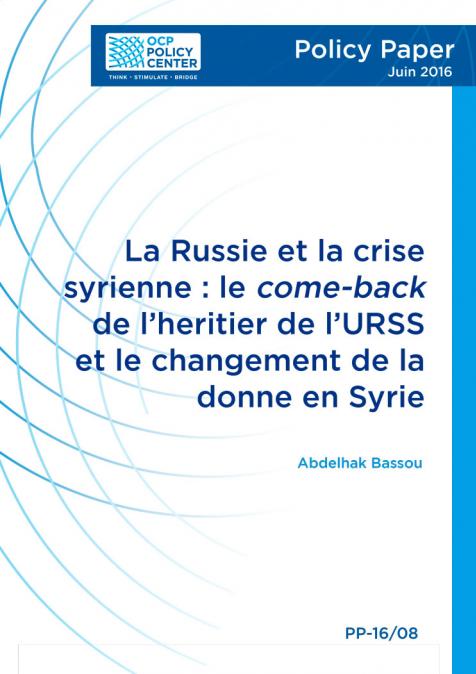RELATED CONTENT
-
AuthorsJune 23, 2016En l’automne 2015 la Russie décide d’intervenir en Syrie. Elle joint le geste à la parole, et arrive à remettre sur pied un régime qui fut chancelant après Quatre années de guerre civile. Cette intervention est alors vue par moult observateurs comme une action dictée par les relations historiques entre le régime des Bechar et l’ancienne URSS. Ce point de vue conforte l’opinion qui veut que la Russie ne soit qu’une version actuelle de l’ancienne URSS. Elle a hérité de sa place au Co ...
-
April 15, 2016Laura El-Katiri, Energy Expert, on Energy in the Mena Region was interviewed in the context of the international conference: “Seven Years after the Crisis: Intersecting Perspectives” ...
-
AuthorsApril 6, 2016Lors du Sommet de Lisbonne des 19 et 20 novembre 2010, l’Alliance atlantique a adopté son troisième concept stratégique post-bipolaire qui consacre le processus de transformation structurelle et fonctionnelle. La projection de puissance et la stabilisation des théâtres extérieurs sont les nouvelles missions qui viennent s’ajouter à la mission classique de la défense mutuelle. Dès lors, l’OTAN passe du rôle d’alliance défensive régionale à celui d’acteur international de sécurité et ...
-
AuthorsFebruary 23, 2016Deux des plus grands producteurs d'hydrocarbures en Afrique, le Nigeria sur l'Atlantique et la Libye sur la Méditerranée font face aux deux groupes terroristes les plus violents sur le continent. Daech version libyenne et Boko Haram semblent avancer pour se rejoindre dans un espace constitué par trois Etats qui présentent des vulnérabilités favorables à l'extension du terrorisme. Au Cameroun, le chao est à craindre dans l'après Biya. La battle fatigue peut atteindre l'Etat tchadien ...
-
AuthorsDecember 7, 2015The Euro-Mediterranean Partnership was initiated with the aim to build a space of shared prosperity and security among all the countries in the region. The achievement of this objective, however, continues to be challenged by several geopolitical, economic and social factors. In such a context, there is now a greater urgency to adapt the approach and the instruments, thus allowing Euro-Mediterranean partners to seize opportunities towards an effective area of shared stability and pr ...
-
-
April 29, 2014GMF - OCP Policy Center Joint Seminar Series Recent Developments in Turkey: Internal and External Implications ...
-
AuthorsKassim BouhouSeptember 17, 2010Before the 9/11 events, US-Maghreb relations were growing stronger, especially after the United States had long left the floor to the Maghreb’s “natural” European partner. Therefore the American action in this region was in line with a mechanism previously set off by Clinton Administration member, Stuart Eizenstat, which aimed at reducing intra regional obstacles and stimulating American investments towards an area where Americans were little-represented. Hence Washington seemed mor ...
-
AuthorsRadhi MeddebSeptember 17, 2010The Gulf Cooperation Council (GCC) is a regional organization which was created in 1981, reassembling six Arab countries together: Saudi Arabia, Kuwait, Bahrain, Oman, Qatar, and the United Arab Emirates (UAE). Thanks to their oil income, GCC countries have enjoyed economic boom since 2002, hence breaking with the 1990s economic slow-down. The year 2002 corresponds to the oil prices’ entry in an upward spiral which has resulted in an increase of both income and foreign assets. This ...








